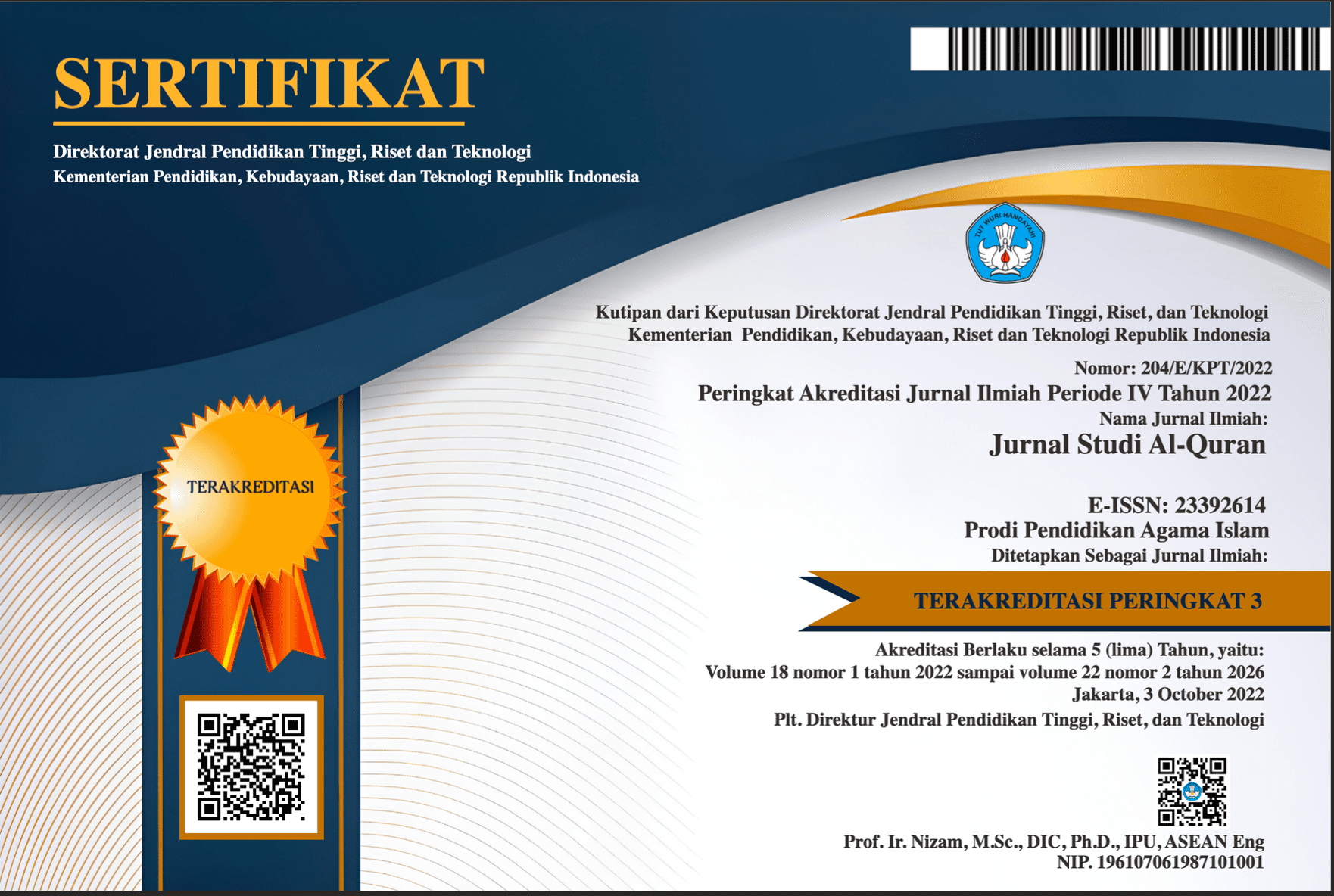Pandangan Anggota Rohis SMA Tentang Radikalisme Agama (Studi Komparatif Rohis SMA Labschool Jakarta dan SMKN 26 Jakarta)
DOI:
https://doi.org/10.21009/JSQ.013.1.03Keywords:
View of radicalism, Religious radicalism, RohisAbstract
The purpose of this study is to describe and analyze the views of Rohis Members in SMA on Religious Radicalism (Comparative Study Rohis SMA Labschool Jakarta and SMK 26 Jakarta). The method used in this research is descriptive analysis. This study uses the theory of Agus SB and Armahedi Mahzar of understanding religious radicalism and the factors that cause radicalism to happen, namely, absolutism, exclusiveness, fanaticism, extremism and agresivism. Based on the results of this study, it can be concluded that 75% of the members of Rohis in SMA Labschool Jakarta believes that religious radicalism is an extreme and superficial understanding of the Islamic religion with the teachings of Islam by a way of coercion or force while 68% of the members of Rohis in SMK 26 Jakarta agree with the statement. While the view that radical Islam is a deep and fundamental understanding of the Islamic religion and fight for Islam teaching peacefully produces an agreement with the percentages on SMK 26 Jakarta 41% higher than the percentage of SMA Labschool Jakarta by 4%. Broadly speaking, the characteristics of radical Islam in the view of the members of Rohis in SMK 26 Jakarta is dominated by fanaticism with 55% and the views of the members of Rohis in SMA Labschool Jakarta is generally dominated by absolutism, fanaticism and exclusiveness by 46%. The members of Rohis’ views of the religious radicalism need to be further deepened with the knowledge of the causes of radicalism and the de-radicalization efforts. So Rohis could be referable to de-radicalise School.
Keywords: View of Radicalism, Religious Radicalism, Rohis
Abstrak
Tujuan penelitian ini adalah mendeskripsikan dan menganalisis Pandangan Anggota Rohis SMA Tentang Radikalisme Agama (Studi Komparatif Rohis SMA Labschool Jakarta dan SMKN 26 Jakarta di Rawamangun). Metode yang digunakan dalam penelitian ini adalah deskriptif analisis. Penelitian ini menggunakan teori Agus SB dan Armahedi Mahzar tentang pengertian radikalisme agama dan faktor-faktor yang menyebabkannya yaitu, absolutisme, eksklusivisme, fanatisme, ekstremisme dan agresivisme. Berdasarkan hasil penelitian dapat disimpulkan bahwa 75% pengurus Rohis SMA Labschool Jakarta berpandangan bahwa radikalisme agama adalah suatu pemahaman agama Islam yang dangkal dan ekstrem dengan memperjuangkan ajaran Islam melalui jalan pemaksaan atau kekerasan sedangkan pengurus Rohis SMKN 26 Jakarta 68% menyetujui pernyataan tersebut. Sedangkan pandangan bahwa radikalisme agama Islam adalah suatu pemahaman agama Islam dengan beragama yang mendalam dan mendasar serta memperjuangkan ajaran Islam secara damai menghasilkan persetujuan dengan persentase pada SMKN 26 Jakarta 41% lebih tinggi dibandingkan dengan persentase SMA Labschool Jakarta yaitu 4%. Secara garis besar karakteristik islam radikal dalam pandangan pengurus Rohis SMKN 26 Jakarta didominasi oleh fanatisme dengan sebesar 55% dan pandangan pengurus Rohis SMA Labschool Jakarta secara garis besar didominasi oleh absolutisme, fanatisme, dan eksklusivisme yaitu sebesar 46%. Pandangan pengurus Rohis mengenai radikalisme agama perlu lebih diperdalam denga pengetahuan penyebab munculnya radikalisme dan upaya upaya deradikalisasi. Sehingga Rohis dapat dijadikan acuan dalam deradikalisasi di Sekolah.
Kata kunci: Pandangan Radikalisme, Radikalisme Agama, Rohis
Downloads
Published
How to Cite
Issue
Section
License
Authors who publish with this Journal agree to the following terms:
- Author retain copyright and grant the journal right of first publication with the work simultaneously licensed under a creative commons attribution licensethat allow others to share the work within an acknowledgement of the work’s authorship and initial publication of this journal.
- Authors are able to enter into separate, additional contractual arrangementfor the non-exclusive distribution of the journal’s published version of the work (e.g. acknowledgement of its initial publication in this journal).
- Authors are permitted and encouraged to post their work online(e.g. in institutional repositories or on their websites) prior to and during the submission process, as it can lead to productive exchanges, as well as earlier and greater citation of published works.
Users/public use of this website will be licensed to CC BY










